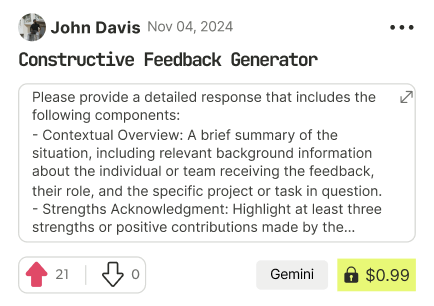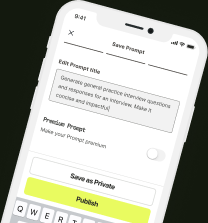prompt mine App
Find, Create & Share AI Magic
Nurturing Family Bonds: Strategies for Busy Schedules
Given the complexities of modern life, it's essential to make a conscious effort to nurture relationships with family members despite hectic schedules. This comprehensive guide provides actionable strategies for regular check-ins, joint activities, milestone celebrations, and open communication channels.
Assumptions:
For this example, we'll assume your family consists of the following roles:
- Two working parents (John and Emily)
- Two school-going children (Michael, age 12, and Sophia, age 9)
- One set of grandparents (George and Margaret) living nearby
Challenges:
Your family often struggles with time constraints due to work, school, and extracurricular activities.
Regular Check-in Routines:
1. Weekly Family Calls: Schedule a 30-minute video call every Sunday evening to catch up and discuss the week's events.
2. Daily Evening Updates: Encourage each family member to share their daily experiences and thoughts through a group chat or messaging app.
3. Monthly One-on-One Meetings: Allocate one hour each month for each parent to have an individual conversation with each child, discussing their interests, goals, and concerns.
Virtual and In-Person Activities:
1. Game Nights: Organize a monthly game night where the family can play board games, card games, or video games together, either in person or virtually.
2. Cooking Sessions: Choose a recipe and cook together virtually or in person, teaching the children about different cuisines and cooking techniques.
3. Outdoor Activities: Plan quarterly outdoor activities like hiking, picnics, or sports events, ensuring everyone participates and spends quality time together.
4. Virtual Movie Nights: Schedule a monthly movie night where the family can watch a movie together, either in person or virtually, and discuss it afterwards.
Milestone Celebrations:
1. Birthdays: Plan a surprise party or a special activity to celebrate each family member's birthday.
2. Achievements: Celebrate the children's academic achievements, sports victories, or other accomplishments with a family dinner or a fun activity.
3. Anniversaries: Mark important anniversaries, such as wedding anniversaries or the children's adoption day, with a special ceremony or celebration.
Open Communication Channels:
1. Active Listening: Encourage family members to listen attentively to each other, asking open-ended questions and showing genuine interest.
2. Non-Judgmental Environment: Foster an environment where family members feel comfortable sharing their thoughts and feelings without fear of judgment.
3. Regular Feedback: Encourage family members to provide constructive feedback to each other, helping to resolve conflicts and improve relationships.
4. Family Meetings: Hold quarterly family meetings to discuss important topics, set goals, and address any concerns or issues.
Additional Tips:
1. Prioritize Quality Time: Make the most of the time you have together, focusing on quality interactions rather than quantity.
2. Be Flexible: Be adaptable and adjust your schedules as needed to accommodate changing circumstances.
3. Show Appreciation: Express gratitude and appreciation for each family member, no matter how small their contribution may seem.
By implementing these strategies, your family can strengthen relationships despite busy schedules, fostering a closer and more supportive bond.

Find Powerful AI Prompts
Discover, create, and customize prompts with different models, from ChatGPT to Gemini in seconds

Simple Yet Powerful
Start with an idea and use expert prompts to bring your vision to life!

